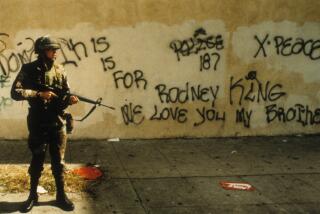Judge in Denny Case Hears Testimony on Mentality of Mobs : Trial: Ruling is due on whether UCLA expert will be allowed to testify before jury on how crowds stop thinking individually.
- Share via
Rioters lose control of their actions and respond to a mob’s escalating frenzy, an expert said Tuesday in the trial of two men accused in a string of attacks at Florence and Normandie avenues.
Armando Torres Morales, a professor at the UCLA School of Medicine, testified outside the jury’s presence that in riot situations, “crowd contagion” sets in and “people stop thinking on their own.”
Such a mood overtook many areas of the city April 29, 1992, he said, after a Simi Valley jury returned not guilty verdicts against four police officers on charges of beating motorist Rodney G. King.
“The atmosphere preceding the verdicts was characterized by widespread tension between minorities and the Los Angeles Police Department,” Morales testified in the trial of Damian Monroe Williams, 20, and Henry Keith Watson, 29.
“African-American males were widely perceived as victims of mistreatment and racism . . .and the legal system was not working for people of color,” Morales said.
Superior Court John Ouderkirk said he may decide by todaywhether to allow Morales to testify in the jury’s presence.
Attorneys for Williams and Watson would like the jury to hear what Morales thinks, to convince the panel that rioters are so out of control that intent to harm others cannot be formed. It is such legal intent that forms the basis for at least two charges against Williams and Watson that could result in life sentences.
Morales testified that riots have no leaders. A leader may emerge, Morales said, but it “is just for that instant. A person does something, and others might take that action. But it’s not a leadership situation.
“A person becomes a leader by acting out a feeling and the group follows, but it’s an expression of the crowd,” Morales said.
Deputy Dist. Atty. Janet Moore tried to link group behavior during riots to gang situations, another area of Morales’ expertise.
Although there have been no gang allegations during the trial, Moore cited hand signals captured on videotape, as well as a blue bandanna worn by a man the prosecution says is Williams.
Morales initially said gang behavior is sublimated by the emotion and excitement of a riot situation. But he later said that some gang members might flash hand signs.
“There can be other motivations going on other than crowd contagion,” he said.
Morales also said heroic acts might emerge in emotional crowd situations.
“People assume different roles on what to do,” Morales said. “It varies from person to person. Some might assume heroic roles and (later) wonder why they did it.”
Attorney Edi M.O. Faal, who represents Williams, said earlier that he wanted Morales to testify because he “has studied mob action and mob violence.
“His testimony goes to the human theory contributing to the movement and condition of people in riotous situations,” he said.
More to Read
Sign up for Essential California
The most important California stories and recommendations in your inbox every morning.
You may occasionally receive promotional content from the Los Angeles Times.




![Vista, California-Apri 2, 2025-Hours after undergoing dental surgery a 9-year-old girl was found unresponsive in her home, officials are investigating what caused her death. On March 18, Silvanna Moreno was placed under anesthesia for a dental surgery at Dreamtime Dentistry, a dental facility that "strive[s] to be the premier office for sedation dentistry in Vitsa, CA. (Google Maps)](https://ca-times.brightspotcdn.com/dims4/default/07a58b2/2147483647/strip/true/crop/2016x1344+29+0/resize/840x560!/quality/75/?url=https%3A%2F%2Fcalifornia-times-brightspot.s3.amazonaws.com%2F78%2Ffd%2F9bbf9b62489fa209f9c67df2e472%2Fla-me-dreamtime-dentist-01.jpg)







